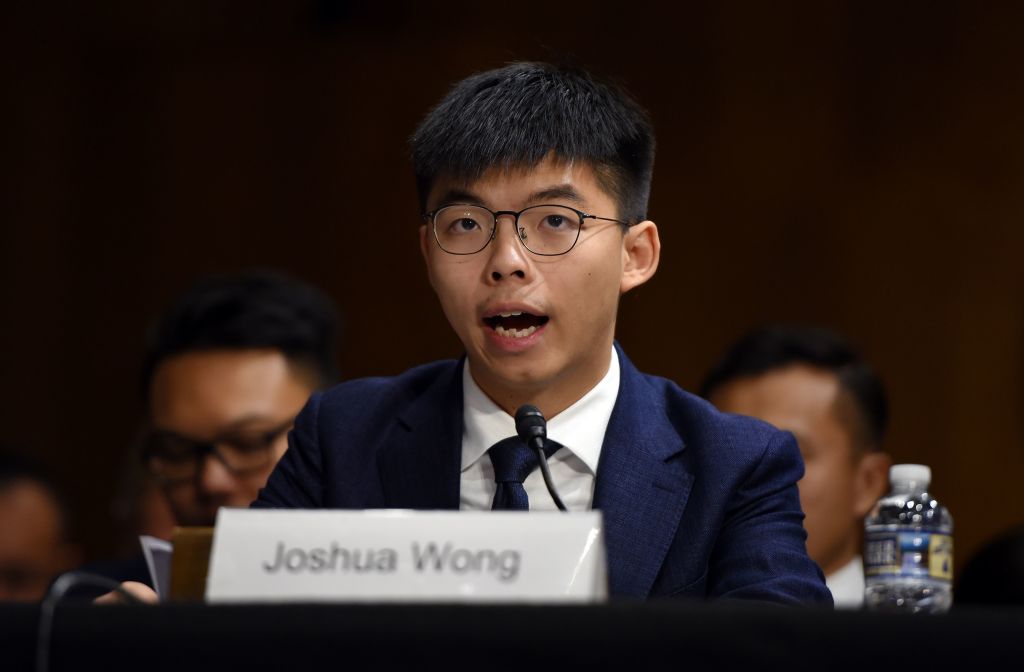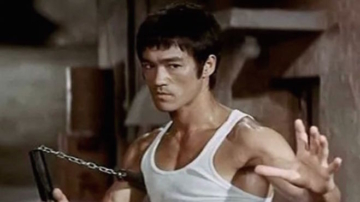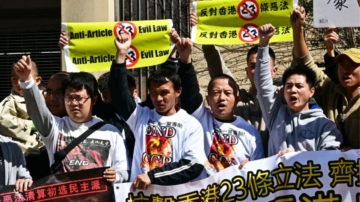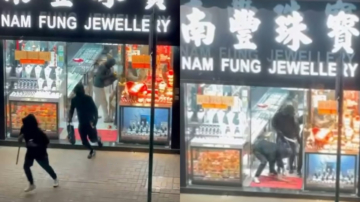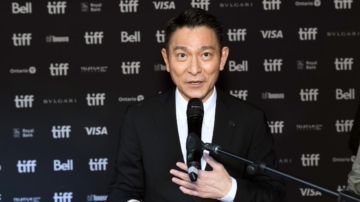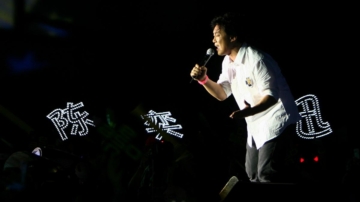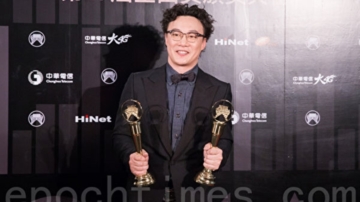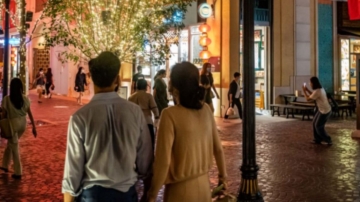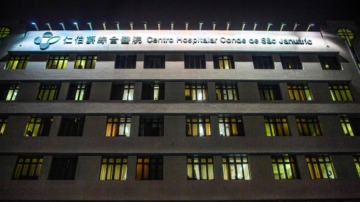【新唐人北京時間2019年09月18日訊】美國國會及行政當局中國委員會星期二(9月17日)上午在華盛頓國會山,就香港動蕩的局勢及美國政策回應等問題舉行了聽證會。獲得美國兩黨參眾議員支持的《香港人權與民主法案》是聽證會討論的焦點。香港Demosisto黨的祕書長、「雨傘運動」的領導人黃之鋒(Joshua Wong)和香港民主活動家及粵語歌手何韻詩(Denise Ho))出席了這次會議,並在會議上就香港的民主運動作證。以下為黃之鋒在這次聽證會上發言的中英文全文。
黃之鋒聽證會發言中文版
麥克高文主席,魯比奧聯席主席,各位委員會成員早晨好!
能夠被邀請來國會大廈談論香港的發展,我感到很榮幸!各位可能還記得我上次在兩年多前去過華盛頓,並在2017年5月3日在同一棟大樓,同一委員會作證。
當時,我警告我的朋友羅冠聰(Nathan Law)可能被取消立法會議員資格,他是亞洲最年輕的民主選舉立法會議員,他今天也在觀眾席上。
我還警告過大規模的政治迫害。不幸的是,兩者都實現了:羅冠聰在7月份失去了席位,我們因為我們參與雨傘運動而於8月被判監。與2014年抗議活動有關的進一步法律糾紛使我無法出國旅行。
我當時曾說香港的「一國兩制」正在變成「一國一點五制」,但我認為,近期發生的事件令觀察家感到今天我們正接近危險的邁向「一國一制」。
目前的情況表明,北京完全無法理解,更不用說治理自由社會了。
這場抗爭於6月9日開始,當時有100萬香港人走上街頭,抗議政府建議修訂逃犯條例,允許疑犯從香港引渡到中國,而中國則無法治保障。不過,在當晚深夜,行政長官林鄭月娥宣布該法案的二讀將在三天內恢復。所以香港人也要為6月12日的背水一戰做準備。
然後發生了不可思議的事情:知道北京在立法會控制了足夠的票數,抗爭者在清早包圍了立法會所在的政府總部,成功的阻止了立法會議員開會。那時我正在第三次服刑。有一刻,我奇怪為甚麼新聞頻道重播了雨傘運動的鏡頭,但是不久我才意識到香港人返出來了。
林鄭於6月15日暫緩了該法案,但沒有完全撤回該法案。第二天, 200萬人歷史性的湧上街頭,相當於我們整個人口的四分之一。我不知道,香港人這種不滿程度,在現代歷史上有那一刻能比得上。
我在三個月前,也就是6月17日出獄,跟著,我和其他香港人一起以最有創意的方式抗爭。除了要求撤回法案,我們要求林鄭撤回我們作為「暴徒」的定性,放棄所有政治檢控,並對警察暴行進行獨立調查。我們中的一些人在6月下旬的20國集團峰會之前眾籌報紙廣告資金,呼籲世界不要忘記香港。其他人於7月1日闖入並占領了立法會大樓,同一天又有55萬香港人和平抗議。
每個週末人群繼續大量出現,幾乎每天都有較小的集會在各區舉行。但是政府不會聽;它沒有化解政治危機,而是大大增強了警察的權力。運動在7月21日達到了轉捩點。那天晚上,涉嫌與有組織犯罪有聯繫的暴徒聚集在元朗火車站,無差別的襲擊了現場記者,回家的抗議者,甚至是路人。儘管多次發出緊急呼籲,警方仍然拒絕出現,使香港陷入無政府狀態和暴徒暴力之中。
僅在8月5日,香港人參加大罷工的那天,警方就發射了800枚催淚彈驅散人群。相比之下,五年前在整個雨傘運動中只發射了87枚,今天警察的過度武力顯而易見。他們越來越肆意的使用胡椒噴霧,胡椒球,橡膠子彈,海綿彈,布袋彈和水炮 –同樣令人不安的是,這些武器,幾乎全部都是從西方民主國家進口的。有鑒於此,我讚賞麥克高文主席上週在眾議院介紹了「保護香港法案」。美國公司不能從熱愛自由的香港人的暴力鎮壓中獲利。
魯比奧聯席主席最近也寫道,根據美國法律,「香港的特殊地位」,「取決於城市被視為一個單獨的關稅區,開放的國際金融聯繫,以及港元與美元的掛鈎。」北京不應該魚與熊掌兩者兼得,在消除我們的社會政治身份的同時,收穫經由香港在環球經濟地位而得來的利益。這是《香港人權與民主法》得到香港公民社會廣泛支持的最重要原因,我希望每位國會議員都能注意到這一點。
林鄭終於在本月早些時候撤回了這項法案,但正如抗爭者早已不再要求她辭職一樣,這一決定現在幾乎毫無意義。這場運動遠未結束,因為它已經超過一個法案或一個人。我們的第五個也是最重要的要求是香港真正的結構性變革。我們政府缺乏代表性是問題的核心。
在我發言時,香港正處於關鍵時刻。各種風險愈來愈高。當局幾乎停止發放「不反對通知書」,因此幾乎每次示威都是「非法集會」。此外,我們面臨的是中國在深圳邊境的龐大軍事集結。習近平主席不太可能在即將到來的十月國慶日之前採取大膽行動,但沒人能確定接下來會發生甚麼。派坦克進城仍是不理性的選擇,儘管並非不可能。中國對澳門,台灣,西藏,特別是新疆的干涉,提醒人們北京準備在追求宏大的帝國計劃方面走得更遠。
我曾經是香港年輕人運動的代言人。然而,在目前的無大台運動中,與我們中間因抗議而被解僱,受傷甚至害怕去醫院,或被迫自殺的人相比,我的犧牲很少。兩個人已失去了一隻眼睛。到目前為止,被捕的1400人中最年輕的是只有12歲的男生。我不認識他們,但他們的痛苦是我的痛苦。我們屬於同一個想像的社區,為自己的自決權而奮鬥,因此我們可以建立一個更加光明,共同的未來。
今天出生的嬰兒在2047年7月1日甚至還未慶祝他的28歲生日,到時香港的「50年不變」政策即將到期。那個限期比它的表面更接近我們,沒有回頭路。數十年後,當歷史學家回顧過去時,我確信2019年比2014年更加明顯,這將成為一個分水嶺。我也希望歷史學家能夠慶祝美國國會站在人權和民主方面的香港人一邊。
黃之峰聽證會發言英文版全文
It’s an honor to be invited back to Capitol Hill to speak about developments in Hong Kong. You may recall that I last traveled to Washington more than two years ago and testified before this commission, in this same building, on May 3, 2017.
At the time, I warned about the probable disqualification of my friend Nathan Law, who had been Asia’s youngest democratically-elected legislator and who is in the audience this morning.
I also warned about massive political prosecution. Unfortunately, both materialized: Nathan lost his seat that July, and we were both imprisoned in August for our roles in the Umbrella Movement. Further legal troublers in relation to the 2014 protests prevented me from traveling abroad.
While I said then that Hong Kong’s “One Country, Two Systems” was becoming “One Country, One-and-a-Half Systems,” I don’t think there is any doubt among observers who have followed recent events that, today, we are approaching dangerously close to “One Country, One System.”
The present state of affairs reveals Beijing’s utter inability to understand, let alone govern, a free society.
The ongoing demonstrations began on June 9 when one million Hong Kongers took to the streets in protest of proposed legislation that would’ve allowed criminal suspects to be extradited from Hong Kong to China, where there are no guarantees of the rule of law. Still, before the night had even ended, Chief Executive Carrie Lam announced the bill’s reading would resume in three days. Hong Kongers were bracing for their last fight on June 12.
And then the unthinkable happened: Knowing that Beijing controlled enough votes in the Legislative Council, protesters surrounded the complex early in the morning, successfully preventing lawmakers from convening. I was then serving my third jail sentence. For a moment, I wondered why the news channel was replaying footage of the Umbrella Movement, though it was not long before I realized Hong Kongers were back.
Lam suspended the bill on June 15, but fell short of fully withdrawing it. A historic two million people demonstrated the following day, equivalent to one in four out of our entire population. I’m not aware of anything comparable to this level of discontent against a government in modern history.
I was released exactly three months ago, on June 17, and have since joined fellow Hong Kongers to protest in the most creative ways possible. In addition to the bill’s withdrawal, we demanded Lam to retract the characterization of us as “rioters,” drop all political charges, and establish an independent investigation into police brutality. Some of us crowdfunded for newspaper advertisements ahead of the G-20 summit in late June calling for the world not to neglect Hong Kong. Others broke into and occupied the Legislative Council complex on July 1, the same day another 550,000 Hong Kongers protested peacefully.
Crowds continued to show up in large numbers every weekend, with smaller rallies taking place almost daily across the territory. But the government would not listen; instead of defusing the political crisis, it dramatically empowered the police. The movement reached a turning point on July 21. That night, thugs with suspected ties to organized crime gathered in the Yuen Long train station and indiscriminately attacked not just protesters returning home, reporters on the scene, but even passersby. The police refused to show up despite repeated emergency calls, plunging Hong Kong into a state of anarchy and mob violence.
On August 5 alone, the day Hong Kongers participated in a general strike, the police shot 800 canisters of tear gas to disperse the masses. Compare that to only 87 fired in the entire Umbrella Movement five years ago, and the police’s excessive force today is clear. Their increasingly liberal use of pepper spray, pepper balls, rubber bullets, sponge bullets, bean bag rounds, and water cannons — almost all of which are imported from Western democracies — are no less troubling. In light of this, I applaud Chairman McGovern for introducing the PROTECT Hong Kong Act last week in the House of Representatives. American companies mustn’t profit from the violent crackdown of freedom-loving Hong Kongers.
Co-Chairman Rubio is also right for recently writing that “Hong Kong’s special status,” under American law, “depends on the city being treated as a separate customs area, on open international financial connections, and on the Hong Kong dollar’s peg to the U.S. dollar.” Beijing shouldn’t have it both ways, reaping all the economic benefits of Hong Kong’s standing in the world while eradicating our sociopolitical identity. This is the most important reason why the Hong Kong Human Rights and Democracy Act enjoys the broad support of Hong Kong’s civil society, a point which I want every member of Congress to take note.
Lam finally withdrew the bill earlier this month, but just as protesters have long stopped calling for her resignation, this decision was almost meaningless by now. The movement is far from over, because it has long moved beyond one bill or one person. Our fifth and most important demand is genuine structural change in Hong Kong. Our government’s lack of representation lies at the heart of the matter.
As I speak, Hong Kong is standing at a critical juncture. The stakes have never been higher. Authorities have all but stopped issuing permits known as “letters of no objection,” so virtually every demonstration is an “illegal assembly.” Moreover, we are confronted by the huge Chinese military buildup just across the border in Shenzhen. President Xi Jinping is unlikely to take bold action before the upcoming 70th National Day in October, but no one can be sure what’s next. Sending in the tanks remains irrational, though not impossible. Chinese interference in Macau, Taiwan, Tibet, and especially Xinjiang, serves as a reminder that Beijing is prepared to go far in pursuit of its grand imperial project.
I was once the face of Hong Kong’s youth activism. In the present leaderless movement, however, my sacrifices are minimal, compared to those among us who have been laid off for protesting, who have been injured but too afraid of even going to a hospital, or who have been forced to take their own lives. Two have each lost an eye. The youngest of the 1,400 arrested so far is only 12-year-old schoolboy. I don’t know them, yet their pain is my pain. We belong to the same imagined community, struggling for our right of self-determination so we can build one brighter, common future.
A baby born today will not even have celebrated his 28th birthday by July 1, 2047, when Hong Kong’s policy of “50-year no change” is set to expire. That deadline is closer to us than it appears; there’s no return. Decades from now, when historians look back, I’m sure that 2019, much more so than 2014, will turn out to have been a watershed. I hope, too, that historians will celebrate the United States Congress for having stood on the side of Hong Kongers, the side of human rights and democracy.
(責任編輯:竺穎)

